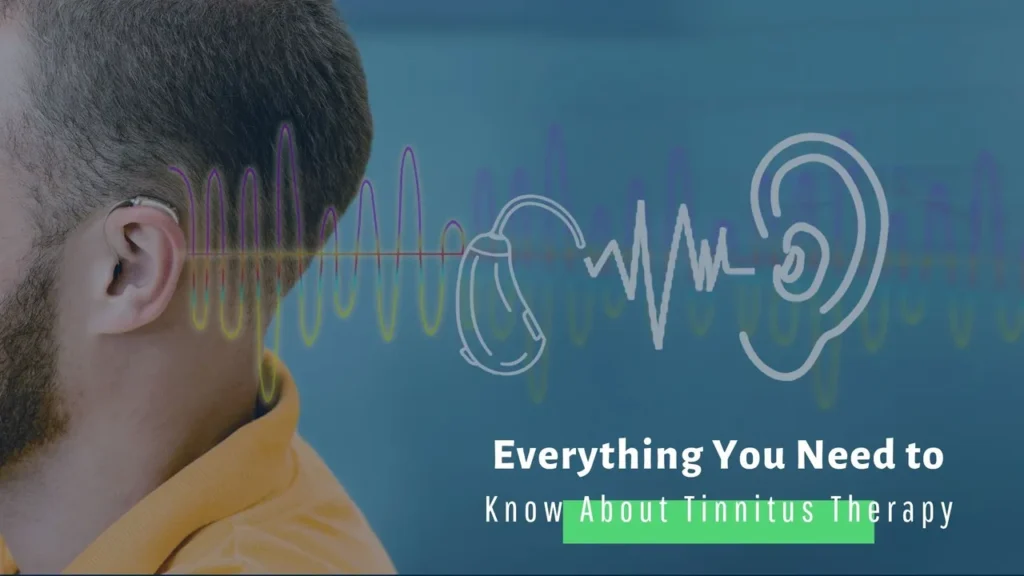Everything You Need to Know About Tinnitus Therapy

Looking for good advice on tinnitus therapy to tame that relentless inner symphony that only you can hear? Fear not, for you’re not alone. You could be one of the estimated 50 million people who have tinnitus.
The unexplained condition causes a sound in the head that has no external source. Many people describe it as a high-pitched ringing, while others describe it as whistling, whooshing, buzzing, chirping, hissing, humming, roaring, or even shrieking.
Finding a solution for tinnitus is not a very hard task. However, you must first get to the core of the problem. Let’s take a look into things in a bit more detail and explore the condition further!
What Is Tinnitus?
Hearing ringing, buzzing, hissing, chirping, whistling, or other sounds in the ears is known as tinnitus (pronounced ti-ni-tus). Tinnitus can produce noises that are either too quiet to be heard or too loud to be heard over other sounds.
The sound may appear to be coming from one or both ears, the interior of the head, or a distance away. It might be continuous or sporadic, steady or pulsing.
The most frequent reason for tinnitus is prolonged exposure to loud noises. 90% of those who have tinnitus experience some degree of hearing loss brought on by noise. Tinnitus, a condition that affects many individuals older than 55, might develop even as a result of conventional ageing.
Normal sounds become less audible as individuals age because the auditory nerve that connects the ear to the brain begins to break.
When the nerve cells of your brain that deal with sounds notice they’re not getting enough signals, they try to make up for it by becoming very sensitive. They crank up their sensitivity so much that they start picking up on what other nearby brain cells are doing. This makes you feel like you’re hearing a sound even when there’s no actual noise around.
Think of it like when a microphone gets too close to a speaker, and you hear that annoying screechy noise—it’s kind of like that happening inside your head.
There are some more reasons that can cause tinnitus –
● When the inner ear is affected by Meniere’s illness
● Damage or injury to the head
● Other health issues such as diabetes, hypertension, allergies, an underactive thyroid, cardiovascular disease, circulation issues, anaemia, and autoimmune diseases
What Are the Most Common Symptoms of Tinnitus?
Tinnitus symptoms might differ greatly from person to person. You could experience phantom noises in your mind, one ear, or both. Although tinnitus is commonly referred to as “ringing in the ears,” those who suffer from the illness may hear:
● Sounds of humming
● Hissing
● Whistling, clicking, whooshing, and buzzing
There may or may not be any sound. Either one or both ears may be affected. Your head may occasionally feel like it is vibrating as a result of the loudness.
If you are suspecting any of these symptoms, you should get things checked out by a professional. We can guide you to the best tinnitus therapy practices.
What Is Tinnitus Therapy?
Tinnitus is quite annoying at best, or completely unbearable at worst. It may sound like a never-ending cricket field, a hissing serpent, or bees swarming. Your mood, thoughts, feelings, job, social life, and general quality of life are all affected by tinnitus. Finding a doctor to treat tinnitus, such as an otolaryngologist (ENT), an audiologist, or a psychologist, is even more problematic.
Tinnitus therapy is the most efficient method for breaking the tinnitus loop. More precisely, Tinnitus Therapy addresses the auditory system (hearing), limbic system (emotions), and autonomic nervous system (fight-or-flight reaction) by using sound therapy and directive psychotherapy over a 12- to 24-month period.
Typically, you get directional therapy while wearing an earpiece that helps hide your tinnitus sensations. TRT may eventually enable you to experience less tinnitus and less anxiety due to your symptoms.
How Is Tinnitus Therapy Used to Treat Tinnitus?
Tinnitus cannot be cured, although, with time, it can lessen in intensity. However, there are techniques to lessen symptoms, shut out the noise, and lessen its effects. Treatments are an iterative process since some people respond well to them while others do not.
Different types of sound treatment designed to help patients tune out the internal soundtrack of tinnitus are one strategy for controlling this illness. They are collectively known as tinnitus therapy.
Tinnitus therapy involves using external sounds to distract from or mask the tinnitus noise. This can include using white noise machines, hearing aids, or even smartphone apps with soothing sounds. In some cases, doctors may prescribe medications to alleviate tinnitus symptoms. These can include antidepressants or anti-anxiety drugs.
Stress and anxiety can worsen tinnitus. Practising relaxation techniques such as deep breathing, meditation, or yoga can be part of your therapy. Making healthy lifestyle choices, such as avoiding loud noises, limiting caffeine and alcohol, and getting regular exercise, can also support tinnitus therapy.
Clearly Hearing Can Help You!
If you choose Clearly Hearing for your tinnitus therapy, we will go above and beyond to help you not only get some relief, but also get an overall better quality of life. We are audiology specialists who also provide consultation on various treatments.
So, contact us today and book an appointment with us to get the care your ears deserve!
